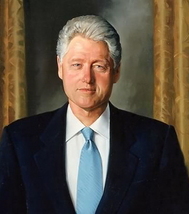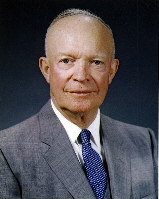Presidents’ Day Special: Small State Blues
A president has been elected from a state with less than 10 electoral votes just four times since 1789

Not only did they fail to win the presidency during the last few election cycles, but they each came from states with a fairly small population.
While of course only one candidate can emerge as the winner, and many contenders hailing from big states fail each time around as well (e.g. Rick Perry in 2012), the struggles of small states to produce a president have been particularly pronounced over the last 200+ years.
A Smart Politics review of presidential elections finds that candidates from small states – those with less than 10 electoral votes – have won the presidency just four times out of 56 elections since 1789.
And just three presidential candidates have bucked this trend:
· Zachary Taylor from Louisiana in 1848 (with 6 Electoral College votes)
· Franklin Pierce from New Hampshire in 1852 (5)
· Bill Clinton from Arkansas in 1992 and 1996 (6)
While it intuitively makes sense that fewer candidates might come from these less populated states, taken collectively, the population pool of small states is quite significant: there have been 1,223 instances in which a state was allotted less than 10 electoral votes in a presidential election, compared to 908 instances for states with more than 10.
In other words, more than 57 percent of states have historically been of the “small state” variety.
But why so few presidents? Is this to be expected?

However, candidates with these political biographies rarely win the White House.
Most presidents, in fact, have a background in the U.S. Senate or were governor of their home state, with 18 of the last 20 presidential election victors since 1932 serving in one these offices (with Eisenhower the exception).
And – no matter what the size – each state has just one governor and two U.S. Senators.
Not only have small state candidates won the White House just four times, a much larger number have been on the losing end of the general election.
Over the last 200+ years, 14 major party candidates from states with less than 10 electoral votes have lost in the general election:
· In 1824, William Crawford of Georgia (9 electoral votes)
· In 1848, Lewis Cass of Michigan (5)
· In 1852, Winfield Scott of New Jersey (7)
· In 1856, John Frémont of California (4)
· In 1864, George McClellan of New Jersey (7)
· In 1884, James Blaine of Maine (6)
· In 1896, 1900, and 1908, William Jennings Bryan of Nebraska (8)
· In 1924, John Davis of West Virginia (8)
· In 1936, Al Landon of Kansas (9)
· In 1964, Barry Goldwater of Arizona (5)
· In 1972, George McGovern of South Dakota (4)
· In 1996, Bob Dole of Kansas (6)
Overall, states with 10+ electoral votes have produced presidents at a 17.4 times greater rate (52 presidents from a base of 908 states, or 5.73 percent) than states with fewer than 10 votes (four presidents from a base of 1,223 states, or 0.33 percent).
Small states will be shut out of the White House once again in 2012 with the remaining major party candidates all coming from delegate-rich states: Barack Obama from Illinois (20), Mitt Romney from Massachusetts (11), Rick Santorum from Pennsylvania (20), Newt Gingrich from Georgia (16), and Ron Paul from Texas (38).
And although candidates from relatively sparsely populated states rarely win the presidency, hailing from the most delegate-rich state is far from a guarantee of White House success in the general election.
The candidate from the state with the most electoral votes only has a modest historical advantage over his opponent in the general election.
In the 53 elections with a challenger, the candidate from the larger state won 28 contests with the candidate from the state with fewer electoral votes winning 19 times.
In six presidential election contests the candidates came from states with the same number of electoral votes:
· In 1832, with Andrew Jackson (Tennessee) and Henry Clay (Kentucky)
· In 1904, with Teddy Roosevelt and Alton Parker (both New York)
· In 1920, with Warren Harding and James Cox (both Ohio)
· In 1940, with FDR and Wendell Wilkie (both New York)
· In 1944, with FDR and Thomas Dewey (both New York)
· In 1996, with Bill Clinton (Arkansas) and Bob Dole (Kansas)
There have been just two instances in which a winning presidential candidate failed to carry his home state: James Polk in 1844 (Tennessee) and Woodrow Wilson in 1916 (New Jersey).
Presidential Election Winners Home State Electoral Vote Tally
|
Year
|
President
|
State
|
Electoral votes
|
|
2008
|
Barack Obama
|
Illinois
|
21
|
|
2004
|
George W. Bush
|
Texas
|
34
|
|
2000
|
George W. Bush
|
Texas
|
32
|
|
1996
|
Bill Clinton
|
Arkansas
|
6
|
|
1992
|
Bill Clinton
|
Arkansas
|
6
|
|
1988
|
George Bush
|
Texas
|
29
|
|
1984
|
Ronald Reagan
|
California
|
47
|
|
1980
|
Ronald Reagan
|
California
|
45
|
|
1976
|
Jimmy Carter
|
Georgia
|
12
|
|
1972
|
Richard Nixon
|
California
|
45
|
|
1968
|
Richard Nixon
|
California
|
40
|
|
1964
|
Lyndon Johnson
|
Texas
|
25
|
|
1960
|
John Kennedy
|
Massachusetts
|
16
|
|
1956
|
Dwight Eisenhower
|
Pennsylvania
|
32
|
|
1952
|
Dwight Eisenhower
|
Pennsylvania
|
32
|
|
1948
|
Harry Truman
|
Missouri
|
15
|
|
1944
|
Franklin Roosevelt
|
New York
|
47
|
|
1940
|
Franklin Roosevelt
|
New York
|
47
|
|
1936
|
Franklin Roosevelt
|
New York
|
47
|
|
1932
|
Franklin Roosevelt
|
New York
|
47
|
|
1928
|
Herbert Hoover
|
Iowa
|
13
|
|
1924
|
Calvin Coolidge
|
Massachusetts
|
18
|
|
1920
|
Warren Harding
|
Ohio
|
24
|
|
1916*
|
Woodrow Wilson
|
New Jersey
|
14
|
|
1912
|
Woodrow Wilson
|
New Jersey
|
14
|
|
1908
|
William Taft
|
Ohio
|
23
|
|
1904
|
Teddy Roosevelt
|
New York
|
39
|
|
1900
|
William McKinley
|
Ohio
|
23
|
|
1896
|
William McKinley
|
Ohio
|
23
|
|
1892
|
Grover Cleveland
|
New York
|
36
|
|
1888
|
Benjamin Harrison
|
Indiana
|
15
|
|
1884
|
Grover Cleveland
|
New York
|
36
|
|
1880
|
James Garfield
|
Ohio
|
22
|
|
1876
|
Rutherford Hayes
|
Ohio
|
22
|
|
1872
|
Ulysses Grant
|
Ohio
|
22
|
|
1868
|
Ulysses Grant
|
Ohio
|
21
|
|
1864
|
Abraham Lincoln
|
Illinois
|
16
|
|
1860
|
Abraham Lincoln
|
Illinois
|
11
|
|
1856
|
James Buchanan
|
Pennsylvania
|
27
|
|
1852
|
Franklin Pierce
|
New Hampshire
|
5
|
|
1848
|
Zachary Taylor
|
Louisiana
|
6
|
|
1844*
|
James Polk
|
Tennessee
|
13
|
|
1840
|
William Harrison
|
Ohio
|
21
|
|
1836
|
Martin Van Buren
|
New York
|
42
|
|
1832
|
Andrew Jackson
|
Tennessee
|
15
|
|
1828
|
Andrew Jackson
|
Tennessee
|
11
|
|
1824
|
John Q. Adams
|
Massachusetts
|
15
|
|
1820
|
James Monroe
|
Virginia
|
25
|
|
1816
|
James Monroe
|
Virginia
|
25
|
|
1812
|
James Madison
|
Virginia
|
25
|
|
1808
|
James Madison
|
Virginia
|
24
|
|
1804
|
Thomas Jefferson
|
Virginia
|
24
|
|
1800
|
Thomas Jefferson
|
Virginia
|
21
|
|
1796
|
John Adams
|
Massachusetts
|
16
|
|
1792
|
George Washington
|
Virginia
|
21
|
|
1789
|
George Washington
|
Virginia
|
12
|
* Lost home state. Table compiled by Smart Politics.
Follow Smart Politics on Twitter.

1. “Ike”: True, he moved to the Keystone State by the time he stood for election again in 1956, and remained there in retirement. However, he never won any (non-presidential) election in said state (he is a native Texan, and a resident New Yorker upon his initial election in ’52).
2. “Barry”: If an expansive view of the quote-unquote home state notion is accorded, then he, too, would most emphatically qualify (ALOHA!).